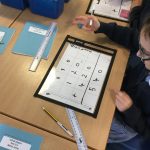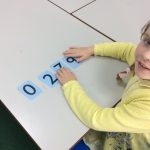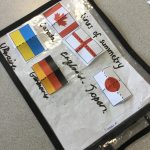Statement of Intent
Mathematics is an important creative discipline that helps us to understand and change. We want all pupils at St Oswald’s Primary School to experience the importance, power and enjoyment of mathematics and develop a sense of curiosity about the subject with a clear understanding. We achieve this through the utilisation of the Mastery approach to teach mathematics.
At St Oswald’s, we foster positive can do attitudes and we promote the fact that ‘We can all do maths!’ We believe all children can achieve in mathematics, and teach for secure and deep understanding of mathematical concepts through manageable, cohesive steps. We use mistakes and misconceptions (Marvellous Mistakes) as an essential part of learning and provide challenge through rich and sophisticated problems.
At our school, the majority of children will be taught the content from their year group only. They will spend time becoming true masters of content, applying and being creative with new knowledge in multiple ways which will prepare them for future learning and life.
We aim for all pupils to:
- become fluent in the fundamentals of mathematics so that they develop conceptual understanding and the ability to recall and apply knowledge rapidly and accurately.
- be able to solve problems by applying their mathematics to a variety of problems with increasing sophistication, including in unfamiliar contexts and to model real-life scenarios
- reason mathematically by following a line of enquiry and develop and present a justification, argument or proof using mathematical language.
- have an appreciation of number and number operations, which enables mental calculations and written procedures to be performed efficiently, fluently and accurately to be successful in mathematics.
Implementation
From EYFS to Year 6 we have adopted the ‘Mastery’ approach across school and teach within single year groups. Teachers reinforce an expectation that all pupils are capable of achieving high standards in mathematics and therefore, the large majority of pupils progress through the curriculum content at the same pace.
Across school, differentiation is achieved by emphasising deep knowledge and through individual support and intervention. Our teaching is underpinned by methodical curriculum design and supported by carefully crafted lessons and resources to foster deep conceptual and procedural knowledge.
- Coherence : As a school we follow the White Rose Maths planning scheme, however we appreciate the need to extend, support and challenge each individual. To do this, we have made some adaptations to the scheme to incorporate a variety of resources, including NCETM, White Rose Maths and Maths No Problem, to aid us in planning lessons that follow small steps allowing for deep and sustainable learning. Being flexible in time spent on a topic and content allows for children to have a deep understanding before they move on to the next steps in their learning.
- Representation and Structure : The concrete, pictorial, abstract (CPA) approach to teaching is used across the whole of the school. This alongside carefully structured lessons which include modelling, the use of stem sentences and exploration help children develop their deeper understanding of different concepts through spotting links and patterns. There will be key representations that they will meet in their journey through school time and time again and the use of different resources in the concrete and pictorial stages will increase their understanding and effective utilisation of the abstract.
- Variation : Including variation with our teaching highlights the central and important concepts of an idea through varying the non-essential features. We work carefully to include variation that will solidify and consolidate understanding and that will also predict and tackle any misconceptions that the children may have in their learning.
- Fluency : At St Oswald’s the teaching of fluency is more than just learning some maths facts mentally: we aim for children to be able to use efficient recall of facts and procedures to think strategically and to solve wider, more in depth problems. This fluency allows children the flexibility to move between different contexts and representations of mathematics, to recognise relationships and make connections and to make appropriate choices from a whole toolkit of methods, strategies and approaches. This does include quick recall of all multiplication and division facts up to 12 x 12 but all staff are aware that the children must have the deep level of understanding behind the facts in order to use them effectively.
- Mathematical Thinking : Mathematical thinking is central to deep and sustainable learning of mathematics. The ideas are taught so that they are understood deeply and are not just ‘received’ passively but worked on by the learner. They need to be thought about, reasoned with and discussed. For our children, mathematical thinking involves looking for pattern in order to discern structure; looking for relationships and connecting ideas and reasoning logically, explaining, conjecturing and proving. Our teachers work extremely hard to incorporate many opportunities for problem solving and they tailor their questioning to develop and deepen the children’s mathematical thinking too.=
As staff, we have been striving to develop our own understanding of the ‘Mastery’ approach with constant CPD training which has included engagement within many different training and work groups including those lead by Maths Hubs and the NCETM.
The documentation below details our policies regarding Mathematics and the progression of skills at St Oswald’s:
Impact
Through a mixture of assessment (summative and formative), pupil voice, lesson observations and book scrutinies etc. the following should be observed and clear:
- Children demonstrate a quick recall of facts and procedures. This includes the recollection of the times table.
- Children show confidence in believing that they will achieve and are aware that mistakes can be made which all can learn from.
- Each child achieves objectives (expected standard) for year group.
- Children show flexibility and fluidity to move between different contexts and representations of maths.
- Children have the chance to develop the ability to recognise relationships and make connections in maths lessons.
- Mathematical concepts or skills are mastered when a child can show it in multiple ways, using the mathematical vocabulary to explain their ideas, and can independently apply the concept to new problems in unfamiliar situations.
- Children show a high level of pride in the presentation and understanding of the work and have enjoyment in learning mathematics.
Assessment Guidance
Mathematics is assessed regularly both formatively (as lessons progress) and summatively (based on an overall collection of evidence). In addition to in-school data collections, there are external data collection points. This is particularly in the EYFS, as part of their Early Learning Goals, in Year 4, as the multiplication check, and at the end of Key Stage 2, in the SATs. Please note, Year 2 SATs have now become non-compulsory.
Guidance and support from the DfE can be found below:
*Information for EYFS Mathematics can be found on page 26.




